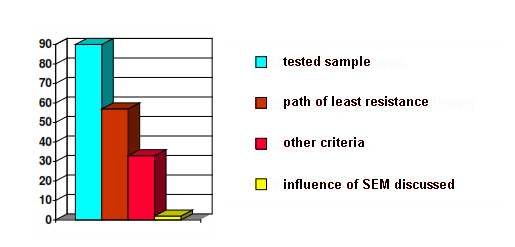Published in Marketing Communications / Modern Educational Methods in Teaching Marketing Communications in Tertiary Education: Coll. 1st Intl. Conf. Prague: Univ. of Finance and Administration, Edition EUPRESS 156, 2011.
ISBN 978-80-7408-055-5.
Belief in the Internet and Critical Thinking
Aleš Krejčí
ABSTRACT
The present-day young generation routinely use the Internet as readily available source of facts, entertainment and communication. Everyday life creates a belief in the acquired information, its freshness and quality. Comfortable working with keywords and search engines further strengthens this belief, although the information may be outdated and the sources questionable. The blind faith in the Internet infected some university students, even in higher classes, where we should expect and require a significant degree of analytical thinking and critical approach. The more it applies to marketing communication students who need to acquire much deeper insight at the forms and mechanisms of media and information environment. The author shows by the results his research that even among students of this branch the situation is far from ideal. Lecturers need to educate independently and critically thinking graduates, whether the development of information technologies will bring anything.
KEY WORDS
marketing education, internet, search engines, keywords, ranking, SEO, Search Engine Marketing
Today’s students, their routine and belief in the Internet
The generation of students who now enter the universities is living with the Internet since childhood and cannot remember the world without Internet. The Internet is for them as well obvious and available as a snack in fast food facility. Many students own Internet applications in their mobile phones. They are connected in the classrooms, in the vehicles, at the gyms, in student clubs. They sacrifice a part of their privacy to a general trend “to be on-line”.
Frequent access to the Internet, e-mail, search engines, and social networks creates a habit to use a software working with precision of machine. User’s movement in the environment of graphic and text menu is familiar, the response to the user’s actions is expected and unremarkable. Daily use of the Internet has become routine. The controlling of various functions and commands became a mechanical activity which no more requires greater focus and a thinking about each step. This automaticity, supported by computer trouble-free operation and a fast Internet connection without interruptions, enhances the subconscious perception of the Internet as the perfect mean to access entertainment, communication and information. Internet is no more a lifestyle, the Internet has become part of life and individual experience of the world. Subconscious perception of the Internet as a reliable key to enter the world of information, i.e. technical or formal aspect of Internet, is gradually transformed into the perception of content of Internet. The user’s mind is then enforcing his belief in the reliability and infallibility of the Internet also in terms of content, increasing the belief in the quality and accuracy of the acquired information. This belief is strengthened to the point, unless the user has a relationship of form and content rationalised, building the “Chinese wall” between the formal (technical) and content acceptance of Internet in his mind.
Young people have less experience with our world than the older people have. During their lives they experienced less “trial-error” cycles, they experienced fewer gains and losses. Thus they have much less reasons not to believe in Internet or to deal with some “Chinese walls” or other restrictions. For most of them the Internet is a world without any constraints, virtual space of supreme freedom and unlimited movement. Therefore, we often find unconditional and uncritical adoption of any information from the Internet among the younger generation.
The credibility of websites
The Internet is undoubtedly an excellent, fast, and flexible tool. What really discomfort us from the pedagogical point of view? Why do we need to use Internet with caution as a source of information when writing student thesis, professional report and scientific article? What weakens the Internet in order to be used as a reference source?
1. Passing character
There is no doubt that the Internet is the most flexible of all the mass media and its use, for example, greatly advanced marketing communication of firms to previously unsuspected levels. “Hanging” of new information, notices, or messages to website may take just few minutes. Equally quickly, however, can disappear from the virtual world of web an information or domain to which we used to visit for years. No references from the Internet early next minute might be valid.
2. Anonymity
Most information available on the Internet can not be traced to their author, often they are collective work. For any mistakes, errors or misinterpretations, whether published by fault of the author or even intentionally, then no one is personally liable; the responsibility of the operator of the website or the domain is restricted only to the cases listed explicitly in a law. On-line encyclopedia of the Wikipedia kind would therefore not be considered relevant for professional and scientific work.
3. Possibly out of date
Many websites do not contain a time stamp of the origin of information. In good faith we can receive information which has long been outdated. If we do not find the copyright symbol and year of publication, some other properties of the website and its contents can give clues about the age of presented information. It is both outdated graphic layout of the site and its operation, both the earlier data contained (statistics, references, annual reports), limited by a certain year or date. Generally applies, too, that the websites of individual entities (companies) used to be more update related to a topic than review portals and encyclopedias.
Search engines – a powerful weapon in the hands of wise users
Research among students of marketing communication
90 students in 5 groups last class of marketing communication study were submitted to write seminary work not exceeding 5 pages. Each group was given the same set of 18 different themes. The task has always been to find the biggest players (leaders) in narrow market segments, to analyze the obtained data and to evaluate them briefly. Specifically, the market segments were defined by various services in travel and hospitality industry, including on-line sales. It is clear that not all companies publish their economic results such as turnover, profit, number of clients served, market share, and other sensitive data. The comparison is not easy.
From the pedagogical point of view, these themes were submitted, among other educational reasons, in order to let the students to demonstrate their skills:
– to identify and filter out irrelevant information sources (outdated sources, half-truths and purpose-built modifications of facts, misinterpretations, PR outputs, ad texts, etc.),
– to find an alternative source(s) of information, not to rely on a single one,
– to find additional criteria for search of the companies with the largest market share and to define the limits of application of these criteria for the evaluation,
– to comment briefly and concisely on issues in a field which is unfamiliar for most of them.
Results: 57 students (63.3 % of the sample) chose to adopt the path of “least resistance”: they simply entered the keywords into a search engine and with those subjects that appeared in the top positions, further and uncritically worked as with leaders of the market segment. Only 33 students (36.6 % of the sample) searched for other sources or criteria: the information of professional associations and unions, articles in professional journals, the results of monitoring users’ visits of website of the relevant companies, professional poll results, etc. Only 2 students discussed explicitly the limited validity of the search engine rankings and emphasised the influence of Search Engine Marketing (SEM) on a website’s attained position.
Fig. 1 Research performed on a sample of 90 students of marketing communication during 2010-2011.
Another phenomenon of almost all student written works, not just those included to this research, is their redundancy. Multiplicity of Internet resources, a superficial approach to the given topic and low concentration of students on the topic result in practice that many students better prefer to copy the entire paragraphs, including advertising texts, according to the motto “the more the better”. By this way they demonstrate their lack of ability to reduce contents to the ordered extension without loss of substantial facts and arguments.
The results mentioned above do not give us optimism. Many of our students are infected with blind faith in the brilliance and infallibility of the Internet. Comfortable working with keywords and search engines further strengthens this belief although the received information may be outdated and the sources questionable. The faith in Internet is even strongly rooted in the last class where we should expect and require a significant degree of analytical thinking and critical approach. The more it applies to the students of marketing communication who need to acquire a much deeper insight at the forms and mechanisms of media and information environment, including the search engine marketing (SEM) and PR communications.
Conclusion: We cannot survive the future without critical thinking
Students and graduates of our universities are able to fly freely in the virtual world of Internet but, paradoxically, many of them can move in more complex levels of abstract thinking only with difficulties. The ability to focus on the topic and immerse into it, recognize different aspects of the problem and relations between them, critically grasp the topic and context, express clearly and unambiguously, these are the qualities that we would like to see in future managers in marketing, media, advertising and PR. The ability of a wider perspective, a novel approach to problem and its non-standard solution are assets of the most talented of them.
All we feel the information explosion that the global emergence of Internet only accelerated. There is no doubt that the trend of information overload will continue. The near future may bring such new communication channels and technical tools on which we now dream neither. The young generation is always closer and more open to the news – the students will still ahead of their teachers in knowledge and usage of new software, social networks and other tools. Teachers must try to keep up but it is not the main task of education. The mission of intelligentsia must remains the same as has always been: to work with information, get it, sort it, to compare, to analyse, … and to transfer the findings to others. Teachers need to educate independetly and critically thinking graduates, whether further development of information technology will bring anything. The base of an educated man – university graduate – cannot be the insertion of keywords into the search engines and copying of finished texts. In a massive scale it would lead to stagnation and gradual decline of our civilization.
Department of Marketing Communication, University of Finance and Administration
Estonská 500, CZ-10000 Praha 10, Czech Republic
World Trend marketing & public relations
Na Hřebenkách 65, CZ-15000 Praha 5, Czech Republic

